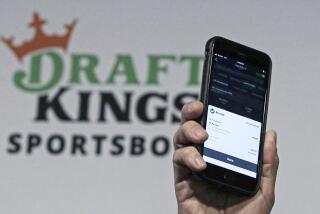Nothing Super for Bettors
- Share via
A bunch of the guys will be going to two parties Sunday. There’s the one during the day in Plainview, N.Y., and by the time the Super Bowl comes on the tube, they’ll move to the other party in Garden City. They’ll stay all evening.
I can’t tell you where the parties are because these people are entitled to their privacy. And you can’t watch the game there, because they get together so they can’t watch the game--husbands and wives, gamblers and significant others.
These are compulsive gamblers who are trying to do something about a terrible affliction. For those others who are still seeking the big hit, this is the most hopeful day of the year. It’s the day to get even.
It’s the cruelest day. That’s why they won’t be watching. Those are Anti-Super Bowl Parties. Some of them will be suffering, thinking they should be there but feeling they’re missing the big chance.
They’re fighting the urge to make a bigger ruin of their lives. The great hype in every day’s newspapers is like walking an alcoholic past a endless row of saloons.
For two weeks the hard cases on the outside have been gathering money from every source, scouring the news to get an edge on everybody else. We read about not drinking and driving; we sloganize, “Just say no” to drugs. There are signs at every high school and college. But where is it written that gambling kills in its way too?
Dave S. knows. I can’t tell you his name, either. It’s enough that he’ll help anyone who asks at Gamblers Anonymous. He knows the feeling. “My strategy was to go through every newspaper and TV program,” he said. “The time I spent to figure out who would score the first touchdown, the first-quarter score, who’d score the first rushing touchdown.
“You could bet on how long the national anthem would take, the coin toss--head or tail. It’s nerve-wracking, tension-filled. You’re irritable because you’re afraid you’re going to miss something.
“By Sunday you’ve formulated an opinion. You gamble to prove you’re smarter and better and now that you’ve come to your decision, you worry if the bookmaker’s phone is going to be busy when you call. Is he going to be caught, and you can’t get your bet down? Maybe I’ve calculated at 13 1/2 points and he tells me the spread is now 17; am I going to throw out my two weeks of worrying?
“Am I going to listen to Mike Francesa and hear him tell me this or that I hadn’t considered? Your blood pressure rises, your colitis sets in, your heart palpitates. And the hype keeps flowing. Shut up while I’m watching!”
“I haven’t bet since Super Bowl IX, and that’s a long time. I’m grateful there’s no local team involved. It’s much more dangerous for me; I’ve been a Giants fan since I was 5.”
Dave is a case history. So is Rocco. “My home was a horror,” he said.
Rocco specialized in horse racing. How bad was his problem? “If Gina Lollabrigida was standing naked in front of me, I’d push her aside so I could watch the finish of the race,” he said. Understand, he is of a certain age.
It was his habit, he said, to come home from work and go to the bathroom with the next day’s entries. It got so, he said, that he couldn’t go to the bathroom without the entries. He laughs now.
He knows about the guy who phoned the hotline to cry that he lost the money he’d saved to send his daughter to college, borrowed to get it back in the Super Bowl and now the shylocks wanted to be paid. “The shys,” Rocco calls them.
The Boston College betting scandal of a few months ago was a visual aid that should have opened some eyes, but probably hasn’t. Ed Looney, director of the New Jersey Council on Compulsive Gambling says the problem is “festering in high school, and in college it’s exploding.”
There were bookmakers available in Boston, but by the time kids got to college most of them already had bookmakers at home. Some of them thought they were so smart and slick they’d just take the bets themselves.
The NCAA threatens to refuse tournament credentials to those newspapers that advertise betting on college games, but they won’t have the nerve to follow through. Colleges don’t make any more effort to fight the problem than a perfunctory hour’s talk with a retired FBI agent.
And we abet the gamblers right in respectable family newspapers. “By putting in the spreads, newspapers say betting on games is a normal thing,” Dave said. Sports betting is legal in Nevada, but not on Nevada games? They say, “Not our kids.”
Looney said he sent a letter to every major newspaper that ran point spreads, saying that’s where kids got the idea to bet, and why not run the 1-800 GAMBLER number at the bottom like the warning on a pack of cigarettes. “Not one has,” Looney said.
His organization expects that $69 million will have been bet legally on this Super Bowl through Las Vegas, and $4 billion illegally at home. The Long Island unit surveyed 643 students at seven high schools in Nassau and Suffolk Counties and found that 40.2% had bet on a game with three dice called “See Low” and 59.1% had bet on sports events.
Like an occasional drinker, most will have no real problem. “We know 80% will not,” Looney said. “For 15%, gambling will have some effect on relationships or money; 5 to 8% will enter the compulsive phase.” Some will steal mom’s jewelry, some will break into their own homes to steal silverware and some will sell marijuana in school.
Looney has counseled a former Ivy League basketball player who, with two other players in the league, bet large amounts and fixed games in the ‘70s. Nobody found out until he turned to GA for help. And you think nobody bets Ivy League basketball.
One guy starts his GA talk by saying he’s a Harvard graduate and a graduate of Sing Sing. Dave was valedictorian of his high school class, dean’s list in college, is a professional person. In high school he was managing the “3 players-6 hits” baseball betting for quarters, having his mother open a Boy Scout account for him.
“At 14 I was making more money than my father did working 40 hours and getting up at 6 a.m.,” Dave said. “No way I was going to be like him. I thought Monday night football was invented for me. I thought those players struggling in the mud were working for me.”
He said he reads the “human interest” stories in the newspaper, talks about sports with his son. He won’t watch the game Sunday.
He says it would be no fun to watch with those people, anyhow. “A lot of them are going to be jumpy, nervous,” Dave said. “They’re thinking, geez--maybe I could have got out today and not been $30,000 in debt; if the Patriots win I wouldn’t have to work two jobs.”
And today the phone will ring with the tearful stories.
More to Read
Go beyond the scoreboard
Get the latest on L.A.'s teams in the daily Sports Report newsletter.
You may occasionally receive promotional content from the Los Angeles Times.










